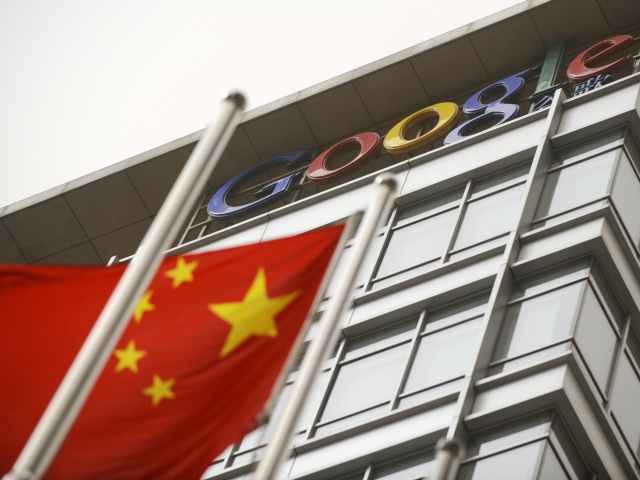This morning’s key headlines from GenerationalDynamics.com
- Amazon’s Jeff Bezos says that America must be defended
- Google repudiates its ‘Don’t Be Evil’ conduct clause, and sides with China
Amazon’s Jeff Bezos says that America must be defended

Jeff Bezos
At a time when employees of high tech companies like Google and Microsoft are adopting holier-than-thou attitudes about defending the United States of America, Amazon CEO Jeff Bezos said on Monday that Amazon is going to work with the Pentagon, and that other high-tech companies should do the same. He said in an interview: “If big tech companies are going to turn their back on US Department of Defense, this country is going to be in trouble. We are going to continue to support the DOD and I think we should.”
In recent months, Google has been almost enthusiastic in its willingness to provide technology to the Chinese government and the Chinese military, while at the same time management has given in to demands that Google not supply technology needed by the U.S. military to defend the country.
Bezos acknowledged that Donald Trump is unpopular among some workers, and particularly expressed disapproval of Trump’s immigration policy, but pointed out that this proves why America is still the best in the world:
I like this country. I know everybody is very conflicted about the current politics and so on. This country is a gem.
There aren’t other countries where everybody is trying to get in. I’d let them in if it were me. I like ’em, I want all of them in. But this is a great country and it does need to be defended.
Amazon is in the process of bidding for a major DoD contract call “The Joint Enterprise Defense Initiative,” or JEDI, a $10 billion development project that will make a cloud computing and storage platform available to all of DoD.
Last week, Google issued a statement saying: “we are not bidding on the JEDI contract because first, we couldn’t be assured that it would align with our AI Principles.” This might actually be a blessing in disguise. Google has said that it will accede to China’s demand that all cloud passwords for Chinese citizens and businesses will be made available to the Chinese government and military, and this would represent a possible security risk to US DoD data on Google’s servers. As a Senior Software Engineer, I have worked on development of these extremely large, complex systems, and I am aware how easy it is for bugs and systemic failure to permit data and services to be hacked.
Microsoft is being pressured to move in the same direction as Google. A recent letter by employees describes Jedi as “a secretive $10 billion project with the ambition of building ‘a more lethal’ military force overseen by the Trump Administration,” and concludes, “Microsoft, don’t bid on JEDI.” However, Microsoft management has not yet acceded to these demands.
Fortunately, there are still some American companies not being run by children. Amazon is expected to be the lead contender for Jedi, but Oracle and IBM are also expected to bid, and Microsoft may do so as well. Wired and BBC and TechCrunch and Medium
Google repudiates its ‘Don’t Be Evil’ conduct clause, and sides with China
When Google was launched in 1998, its unofficial slogan was “Don’t be evil.” It was a corporate principle that “you can make money without doing evil,” and “Don’t be evil” was part of the company’s official code of conduct until this year.
With no fanfare, Google removed “Don’t be evil” from its code of conduct sometime between April 21 and May 4, when it simply disappeared from the Google website.
Shortly after that, in May, Google announced that would not renew its contract with DoD for Project Maven, which provides AI technology for analyzing drone footage, because its employees objected to doing any work for the American military.
But in December of last year, Google announced that it would open a state of the art AI development center in Shanghai, where the most advanced AI technology would be made available to the Chinese government and the Chinese military.
The biggest public scandal this year occurred when word leaked out in July that Google for almost two years had 200 programmers working on an advanced AI search engine for China called Dragonfly that would detect users who made requests that violated Chinese Communist Party (CCP) censorship rules, and would make personal identifying information about such users available to the Chinese government and Chinese military.
Google has refused comment about Project Dragonfly, saying that it is an experimental system, with no current plans to deploy it. But in fact, Google’s search engine chief, Ben Gomes, told an internal meeting in July that the plan was to launch the search engine as soon as possible — and to get it ready to be “brought off the shelf and quickly deployed” once approval from Beijing was received.
On Monday of this week, Google CEO Sundar Pichai, an American who was born in India, defended Project Dragonfly. He said that Project Dragonfly will still be able to answer “well over 99 percent of the queries” put to it and that “there are many, many areas where we would provide information better than what’s available.” I am not sure that he understood the message he was sending with that remark, but it implies that the other 1 percent would be subject to arrest by China’s police.
As China continues to prepare to launch a war against the United States, it is hard to avoid the impression that Google has already chosen the side that it wants to win that war, and it is not the United States.
And somebody ought to tell Sundar Pichai that those same super-intelligent weapon systems that Google is helping the Chinese military to build will also be used against his native India. Perhaps that thought never occurred to him.
And finally, Chinese employees working in America should realize how dangerous Google’s policy is for them personally. During World War II, Japanese Americans were interned. After 9/11, Muslim Americans were jailed without trial. The path that Google is on will adversely affect all Chinese-Americans, and an anti-Chinese public mood could materialize overnight. Gizmodo (18-May) and Gizmodo (1-Jun) and CNBC (13-Dec-2017) and NY Times (16-Aug) and The Intercept (9-Oct) and Washington Post
Related Articles:
- Google is repeating the mistakes that IBM made in helping the Nazis (06-Oct-2018)
- Trump blocks Broadcom acquisition of Qualcomm over national security (14-Mar-2018)
- Huawei scandal exposes potential ‘Cyberwar Pearl Harbor’ from China (14-Oct-2012)
- New report reveals massive cyber war attack by China’s army (20-Feb-2013)
- Major defense contractor QinetiQ hacked for years by China (06-May-2013)
KEYS: Generational Dynamics, Amazon, Jeff Bezos, Joint Enterprise Defense Initiative, JEDI, Google, Project Maven, Project Dragonfly, China, Ben Gomes, Sundar Pichai
Permanent web link to this article
Receive daily World View columns by e-mail

COMMENTS
Please let us know if you're having issues with commenting.